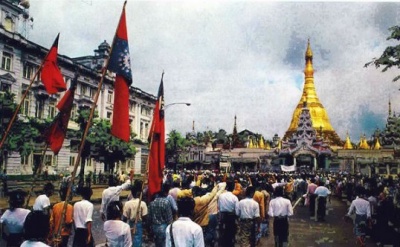Difference between revisions of "The Troubles in Burma"
(Created page with "=== 1948-Present === 400px|thumbnail|left After gaining independence from Great Britain in 1948, communist rebels launched an uprising against the ne...") |
(→1948-Present) |
||
| Line 2: | Line 2: | ||
[[File:1948-Present.jpg|400px|thumbnail|left]] | [[File:1948-Present.jpg|400px|thumbnail|left]] | ||
After gaining independence from Great Britain in 1948, communist rebels launched an uprising against the new government. Ethnic conflicts and political rebellions broke out in various provinces of Burma, and these continued into 1949. Due to a lack of reconciliation and cultural understanding between factions, the conflict reached a new height in 1988 with the 8888 Popular Uprising, in which thousands of protesters took to the streets across the state. The uprising ended on 18 September, 1988 after a military coup was conducted by the State Law and Order Restoration Council. Since then, Burma has continued to be governed by the military regime, but internal tensions still remain. | After gaining independence from Great Britain in 1948, communist rebels launched an uprising against the new government. Ethnic conflicts and political rebellions broke out in various provinces of Burma, and these continued into 1949. Due to a lack of reconciliation and cultural understanding between factions, the conflict reached a new height in 1988 with the 8888 Popular Uprising, in which thousands of protesters took to the streets across the state. The uprising ended on 18 September, 1988 after a military coup was conducted by the State Law and Order Restoration Council. Since then, Burma has continued to be governed by the military regime, but internal tensions still remain. | ||
| + | |||
| + | [[Category:Peacebuilding and Reconciliation]] | ||
Latest revision as of 13:59, 28 March 2014
1948-Present[edit]
After gaining independence from Great Britain in 1948, communist rebels launched an uprising against the new government. Ethnic conflicts and political rebellions broke out in various provinces of Burma, and these continued into 1949. Due to a lack of reconciliation and cultural understanding between factions, the conflict reached a new height in 1988 with the 8888 Popular Uprising, in which thousands of protesters took to the streets across the state. The uprising ended on 18 September, 1988 after a military coup was conducted by the State Law and Order Restoration Council. Since then, Burma has continued to be governed by the military regime, but internal tensions still remain.
